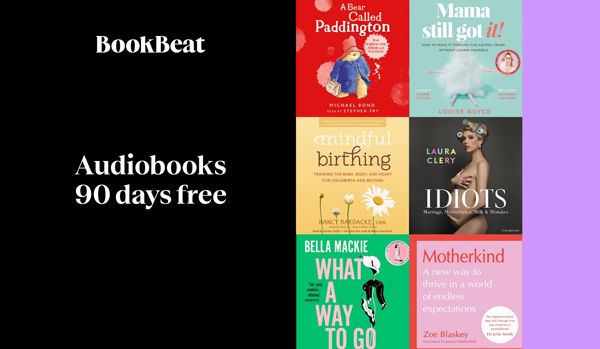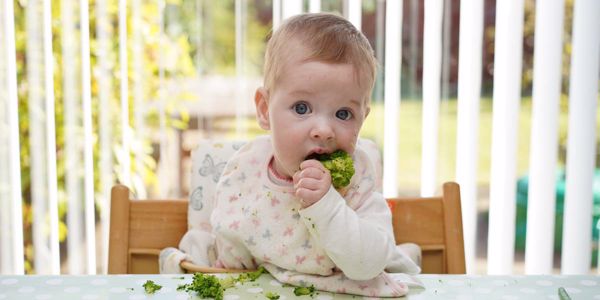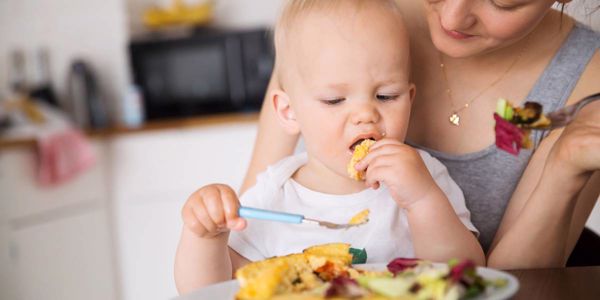It goes without saying that unless you are advised to start sooner by a doctor, you shouldn’t start weaning onto solids until your child is at least 6 months old and has met the developmental criteria. Weaning is very much seen as a milestone for babies but it is really important that he or she is able to sit up totally unaided and has lost the tongue-thrust reflex. Once you’ve decided whether you are going to plough ahead with Baby Led Weaning or stick with more traditional purees- or even a combination of the two- you can use these tips to make the process as painless for you, and as fun for your baby as possible.
1 KIT: You will want to make sure you have everything you need to prepare and store food, serve it, and minimise the mess. My absolute favourite products have been silicone bibs with a pouch to collect dropped food, a waterproof wipeable play mat for under the high chair from Bare + Boho and bamboo suction plates and bowls. Choosing the right high chair is also important, experts say a footrest is crucial for helping baby feel supported at the table. There are plenty of gadgets and contraptions on the market that you really will not need but Cassius always refused to be spoon-fed, so small cutlery for baby fists really came in handy for us.
2 Don’t Overwhelm: This goes for you and for baby. Weaning doesn’t need to be daunting, it should be fun! Don’t feel pressured to introduce a million different recipes, don’t fret over making sure every meal you offer is 100% organic, nourishing, hand prepared and don’t overwhelm the baby with massive portions. They will absolutely refuse to eat sometimes and that’s okay. Just made sure you are offering a nice variety of flavours and textures because at 6 months old they are still getting all their nutrition from milk.
3 Keep Notes: It is a good idea to keep track of what you are offering the baby initially, especially if you have a history of allergies or intolerances in the family. We have a really strong family history of dairy allergies and I was super paranoid that Cassius would have trouble when we started weaning. Luckily he was fine but I tried to stick to only introducing a foods that are common allergens once every couple of days so I could watch out for any bad reactions. With some breastfed babies you may already know that your baby won’t tolerate some foods, because you may have had to cut them out of your own diet. Some common allergens to watch out for are wheat, dairy, eggs, soya, seafood and (Strangely enough) tomatoes.
4 Be prepared: The best thing you can do in advance of weaning is a first aid course. It is generally beneficial to do a baby first aid course before your baby is born but it is particularly useful to do a refresher on how to deal with choking. This is more of a worry with Baby Led Weaning but babies can still have difficulty with pureed foods- one of the reasons it is so important that you make sure they have lost their tongue-thrust reflex before weaning. There are lots of ways we can minimise choking risks for babies and toddlers and that is mainly by preparing the food the right way; cutting food into batons that baby can grip- a crinkle cutter makes them easier for tiny hands to hold onto- slicing grapes in half lengthways, ditto cherry tomatoes, cutting anything with a skin that could be swallowed whole like sausages, blueberries and so on. I am super paranoid about fruit in particular because Cassius just attempts to inhale things without chewing, even at 21 months old with a near full set of teeth. Baby-led weaning is brilliant, Cass is a super independent eater and I have never had to worry about preparing separate meals or blending foods.
5 Have fun! Weaning is setting your child up for a whole lifetime of eating and this process can really set the tone for their relationship with food. Don’t put too much pressure on them to eat, have fun experimenting with recipes and make family mealtimes enjoyable. Eating is a very social activity and your baby will love being a part of this at the dinner table. Don’t be afraid to try strong flavours, unusual ingredients or to offer foods that you wouldn’t consider baby foods; as long as you aren’t adding salt there is very little that you need to avoid in a baby’s diet.







